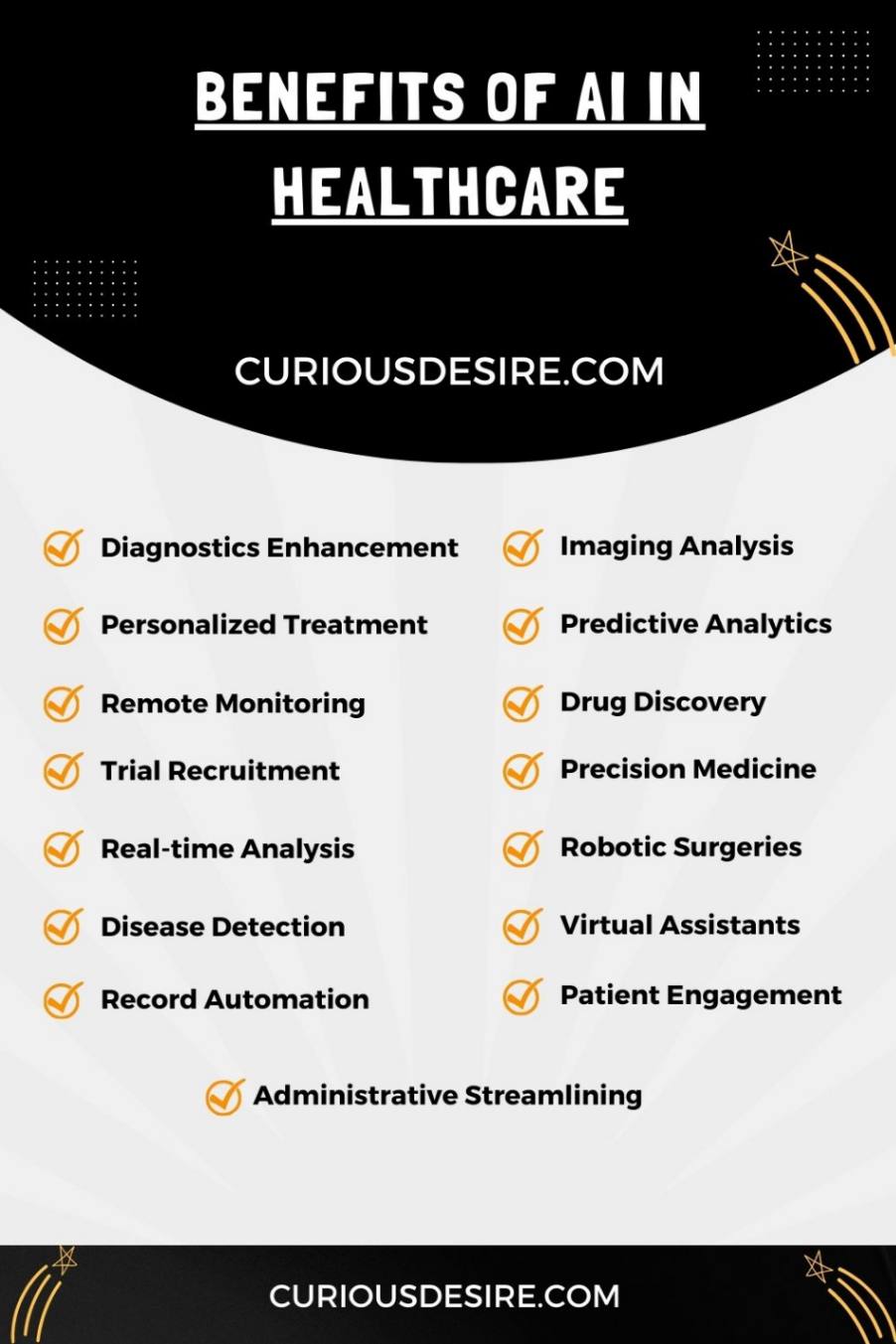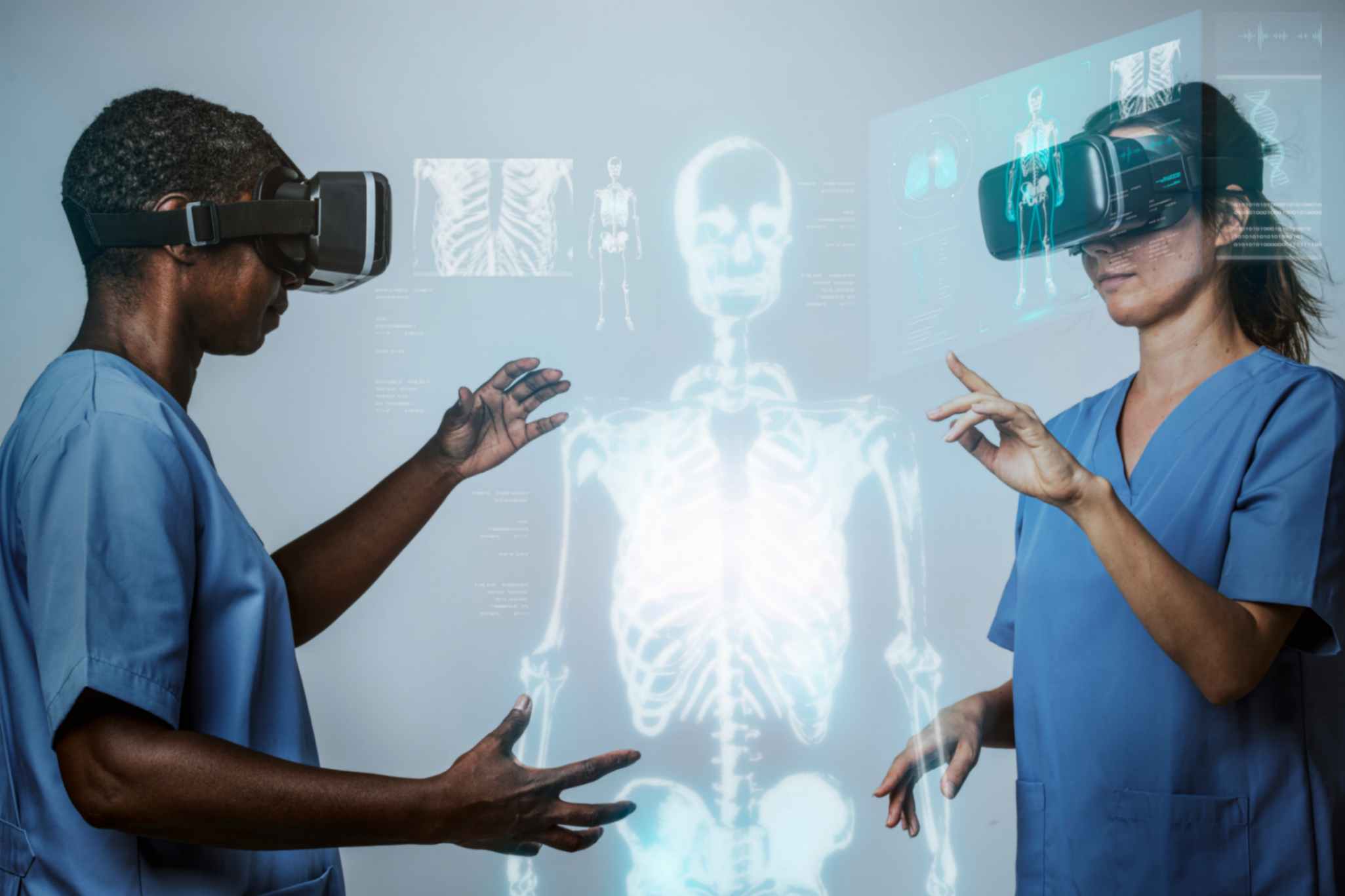In recent years, artificial intelligence (AI) has emerged as a game-changer in the field of healthcare, offering innovative solutions to some of the most pressing challenges facing the industry.
With its ability to analyze vast amounts of data, recognize patterns, and make intelligent decisions, AI holds immense promise for revolutionizing the way healthcare is delivered and experienced.
In this article, we delve into the significance of AI in healthcare and explore 15 key benefits it brings to the table.
From improved diagnostics and personalized treatment plans to streamlined administrative tasks and enhanced patient engagement, AI is poised to transform every aspect of healthcare delivery, ultimately leading to better outcomes for patients and providers alike.
Here are the 5 most common benefits of AI in healthcare:
- Improved diagnostics
- Enhanced medical imaging analysis
- Streamlined administrative tasks
- Patient engagement and education
- Precision medicine advancements

1. Improved Diagnostics
AI plays an important role in improving diagnostics by analyzing vast amounts of medical data quickly and accurately. With AI, doctors can detect diseases at earlier stages, leading to timely interventions and better patient outcomes.
For instance, AI algorithms can analyze medical images like X-rays and MRIs with high precision, helping doctors identify abnormalities that might be missed by the human eye.
This leads to more accurate diagnoses and allows healthcare providers to tailor treatment plans accordingly, ultimately saving lives and reducing healthcare costs.
Improved diagnostics through AI not only enhances patient care but also contributes to the overall efficiency and effectiveness of healthcare systems.
2. Personalized Treatment Plans
AI assists doctors in crafting treatment plans tailored to each patient’s specific needs, enhancing the effectiveness of healthcare interventions.
By analyzing vast amounts of patient data, including medical history, genetic information, and lifestyle factors, AI algorithms can identify patterns and correlations that allow personalized recommendations.
This individualized approach ensures that patients receive treatments optimized for their unique circumstances, leading to better outcomes and improved quality of life.
For example, AI might suggest a particular medication dosage or therapy regimen based on a patient’s genetic predisposition to certain diseases, ultimately resulting in more precise and targeted care.
3. Enhanced Medical Imaging Analysis
AI enhances the accuracy and efficiency of medical imaging analysis, allowing healthcare providers to make more informed diagnoses and treatment decisions.
Traditional methods of interpreting medical images, such as X-rays and CT scans, can sometimes miss subtle abnormalities or require extensive manual review by radiologists.
AI algorithms, however, excel at detecting patterns and anomalies in images, allowing for faster and more accurate diagnoses. This advanced analysis not only reduces the likelihood of missed diagnoses but also improves patient outcomes by facilitating earlier detection and intervention.
For instance, AI-powered image analysis software can identify early signs of cancer or other diseases, enabling timely treatment and potentially saving lives.

4. Predictive Analytics for Patient Outcomes
AI-driven predictive analytics allow healthcare providers to anticipate patient outcomes and proactively intervene to improve them.
By analyzing large datasets containing patient demographics, medical history, and treatment options, AI algorithms can identify risk factors and predict the likelihood of adverse events or complications.
This predictive capability empowers healthcare professionals to implement preventive measures and personalized interventions that optimize patient outcomes.
For example, predictive analytics might forecast the probability of readmission following a hospital discharge, prompting healthcare providers to implement targeted interventions such as post-discharge monitoring or follow-up care to reduce the risk of readmission and improve patient recovery.
5. Streamlined Administrative Tasks
AI automates and streamlines administrative tasks in healthcare settings, reducing workload and improving operational efficiency. Tasks such as appointment scheduling, billing, and patient inquiries can be time-consuming and resource-intensive when performed manually.
AI-powered solutions, such as chatbots and virtual assistants, can handle these tasks autonomously, freeing up healthcare staff to focus on patient care and more complex responsibilities.
This automation not only improves the efficiency of healthcare operations but also enhances the patient experience by providing faster and more responsive service.
For example, a virtual assistant powered by AI can assist patients in scheduling appointments, answering common questions, and accessing healthcare resources, thereby reducing wait times and improving overall satisfaction with the healthcare system.
6. Remote Patient Monitoring
AI facilitates remote patient monitoring by allowing the continuous collection and analysis of health data from patients outside of traditional healthcare settings.
Wearable devices equipped with sensors can monitor vital signs, activity levels, and other health metrics in real time, allowing healthcare providers to remotely track patients’ health status and intervene proactively when necessary.
For example, AI algorithms can detect early warning signs of deteriorating health in patients with chronic conditions, enabling timely interventions to prevent complications and reduce hospital readmissions.
Remote patient monitoring powered by AI enhances patient care by providing continuous monitoring and personalized interventions, leading to improved health outcomes and reduced healthcare costs.
7. Drug Discovery and Development
AI accelerates the drug discovery and development process by allowing the rapid analysis of large datasets and the identification of potential drug candidates with higher efficiency and precision than traditional methods.
AI algorithms can analyze vast amounts of biological data, including genomic sequences, protein structures, and drug interactions, to identify promising drug targets and predict the efficacy and safety of potential drug compounds.
For example, AI-driven computational models can simulate the behavior of molecules and predict their pharmacological properties, helping researchers prioritize the most promising candidates for further testing.
AI-powered drug discovery and development not only reduce the time and cost associated with bringing new drugs to market but also increase the likelihood of success by identifying novel targets and optimizing drug design.

8. Efficient Clinical Trial Recruitment
AI streamlines the recruitment process for clinical trials by identifying eligible patients more efficiently and effectively than traditional recruitment methods. AI algorithms can analyze electronic health records, medical databases, and patient data to identify potential candidates who meet the criteria for specific clinical trials.
By automating the screening process and matching patients to relevant trials, AI accelerates the recruitment process, reduces administrative burden, and improves patient access to experimental treatments.
For example, AI-powered recruitment platforms can match patients with clinical trials based on their medical history, demographic characteristics, and treatment preferences, allowing researchers to enroll participants more quickly and efficiently.
Efficient clinical trial recruitment powered by AI expedites the development of new treatments and therapies, ultimately benefiting patients by accelerating the translation of scientific discoveries into clinical practice.
9. Precision Medicine Advancements
AI drives advancements in precision medicine by enabling personalized diagnosis, treatment, and prevention strategies tailored to individual patient’s unique genetic makeup, lifestyle factors, and environmental influences.
AI algorithms can analyze large-scale genomic data, electronic health records, and other patient data to identify patterns and correlations that inform personalized healthcare decisions.
For example, AI-powered predictive models can assess a patient’s genetic risk factors for certain diseases and recommend targeted screening or preventive measures to reduce their risk.
Precision medicine advancements powered by AI allow healthcare providers to deliver more precise and effective interventions, optimize treatment outcomes, and improve patient satisfaction.
10. Real-Time Health Data Analysis
AI enables real-time analysis of health data from diverse sources, including electronic health records, wearable devices, and medical sensors, to provide timely insights and interventions for patients’ health management.
AI algorithms can process and analyze streaming data in real time, detecting patterns, anomalies, and trends that may indicate changes in a patient’s health status or risk factors.
For example, AI-powered monitoring systems can alert healthcare providers to abnormal vital signs or deviations from baseline health parameters, prompting timely interventions to prevent adverse events or complications.
Real-time health data analysis powered by AI enhances patient safety, facilitates early intervention, and improves clinical decision-making by providing actionable insights at the point of care.
11. AI-Powered Robotic Surgeries
AI enhances surgical precision and outcomes by powering robotic systems that assist surgeons during minimally invasive procedures.
Robotic surgical systems equipped with AI algorithms can analyze real-time data from imaging devices and sensors to guide surgical instruments with greater accuracy and dexterity than human hands alone.
For example, AI-powered robotic surgeons can perform complex procedures with sub-millimeter precision, reducing the risk of complications, minimizing trauma to surrounding tissues, and speeding up recovery times.
AI-powered robotic surgeries improve patient outcomes by allowing safer, more precise procedures and expanding the capabilities of surgeons to tackle challenging cases.
12. Early Disease Detection
AI enables early detection of diseases by analyzing diverse sources of health data to identify subtle signs and patterns indicative of disease onset or progression.
AI algorithms can analyze medical images, genetic data, and biomarkers to detect early-stage diseases that may be missed by conventional screening methods.
For example, AI-powered diagnostic tools can identify early signs of cancer in medical images or detect biomarkers associated with the early stages of neurodegenerative diseases.
Early disease detection powered by AI allows timely interventions, improves treatment outcomes, and enhances patient survival rates by facilitating early diagnosis and intervention when diseases are most treatable.
13. Virtual Health Assistants
AI-driven virtual health assistants provide personalized support and guidance to patients, enhancing access to healthcare services and improving patient engagement.
Virtual health assistants powered by AI can interact with patients through natural language processing and provide information, guidance, and support across a wide range of healthcare tasks.
For example, AI-powered virtual assistants can answer patients’ questions, provide medication reminders, and offer lifestyle advice based on individual health needs and preferences.
Virtual health assistants improve patient engagement by offering convenient access to healthcare resources, enhancing communication between patients and providers, and empowering patients to take an active role in managing their health.

14. Automated Medical Record-Keeping
AI automates and streamlines medical record-keeping processes, improving the efficiency and accuracy of healthcare documentation.
AI-powered systems can extract, analyze, and organize information from diverse sources, including electronic health records, clinical notes, and diagnostic reports, to generate comprehensive and structured medical records.
For example, AI-powered transcription software can convert spoken dictation into written text, while natural language processing algorithms can extract key information from unstructured clinical notes.
Automated medical record-keeping powered by AI reduces the administrative burden on healthcare providers, minimizes documentation errors, and enhances the accessibility and usability of medical records for clinical decision-making and patient care.
15. Patient Engagement and Education
AI enhances patient engagement and education by delivering personalized health information, resources, and support tailored to individual patient needs and preferences.
AI-driven patient engagement platforms can analyze patient data, preferences, and behaviors to deliver targeted interventions and educational content through various channels, such as mobile apps, chatbots, and virtual assistants.
For example, AI-powered patient engagement platforms can provide personalized health tips, reminders, and educational materials based on patient’s health goals and conditions.
Patient engagement and education powered by AI empower patients to make informed decisions about their health, improve adherence to treatment plans, and promote collaborative relationships between patients and healthcare providers for better health outcomes.
The Transformative Role of Artificial Intelligence in Future Medicine
In the future of medicine, artificial intelligence (AI) is expected to play a transformative role across various aspects of healthcare. AI has the potential to revolutionize medical diagnosis, treatment, and patient care by leveraging advanced algorithms and data analytics.
It will allow more accurate and personalized diagnostics, facilitate the discovery and development of new drugs and therapies, streamline administrative tasks, improve patient outcomes through predictive analytics, and enhance patient engagement and education.
Overall, AI holds the promise of driving innovation, improving efficiency, and transforming the delivery of healthcare services in the future.
Conclusion
In conclusion, the benefits of AI in healthcare are substantial and far-reaching. AI has the potential to improve patient outcomes, enhance diagnostic accuracy, streamline administrative tasks, and revolutionize treatment approaches.
By leveraging advanced algorithms and data analytics, AI empowers healthcare professionals to deliver more personalized and efficient care, ultimately leading to better health outcomes for patients.
With ongoing advancements in AI technology, the future of healthcare holds tremendous promise for improving the quality of life and transforming the delivery of medical services.
Benefits of AI in Healthcare FAQs
1. How does AI improve medical imaging analysis?
AI enhances medical imaging analysis by identifying subtle abnormalities in images, aiding in more accurate diagnoses and treatment planning.
2. Can AI assist in early disease detection?
Yes, AI can analyze various health data to detect early signs of diseases, enabling timely interventions and improved patient outcomes.
3. What role does AI play in personalized medicine?
AI enables personalized medicine by analyzing patient data to tailor treatment plans according to individual genetic makeup, lifestyle factors, and medical history.
4. How does AI streamline administrative tasks in healthcare?
AI automates repetitive administrative tasks such as appointment scheduling and billing, freeing up healthcare staff to focus on patient care and improving overall efficiency.
5. Can AI predict patient outcomes?
Yes, AI-powered predictive analytics can forecast patient outcomes based on various factors, aiding healthcare providers in making informed decisions and interventions.
6. How does AI impact drug discovery and development?
AI accelerates drug discovery by analyzing large datasets to identify potential drug candidates more efficiently, ultimately speeding up the process of bringing new treatments to market.
7. What are the ethical considerations surrounding AI in healthcare?
Ethical considerations include patient privacy, data security, and the potential for bias in AI algorithms, highlighting the need for robust regulations and ethical guidelines.
8. How can AI enhance patient engagement and education?
AI-driven virtual assistants and personalized health apps can provide patients with tailored information, reminders, and support, empowering them to take a more active role in managing their health.